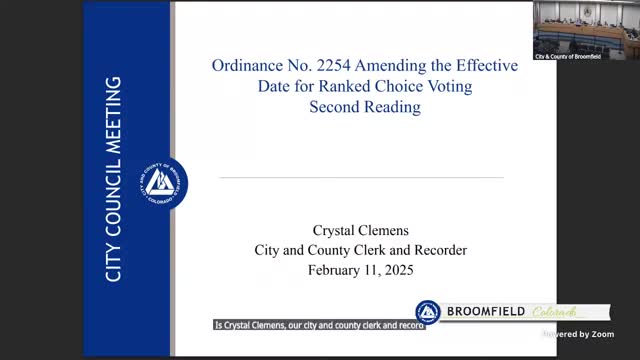Broomfield delays implementation of ranked-choice voting until 2027
Get AI-powered insights, summaries, and transcripts
Subscribe
Summary
On second reading the council amended the effective date for ranked-choice voting implementation to the Nov. 2, 2027 coordinated election, citing missing state audit rules and higher-than-expected costs.
BROOMFIELD, Colo. — The Broomfield City and County Council on Feb. 11 approved ordinance 2254 on second reading to delay implementation of ranked-choice voting for mayoral and city council elections until the Nov. 2, 2027 coordinated election.
The council voted 8-1 to amend the effective date after staff described two practical obstacles: the Colorado secretary of state pushed back the deadline to adopt risk-limiting-audit (RLA) rules for ranked voting to Jan. 1, 2026; and Dominion Voting Systems notified counties of an incremental software fee of $35,000 per election to enable ranked-choice functionality. City staff had estimated an initial implementation cost of about $170,000 based on other Colorado jurisdictions; with the software fee the estimate rose to roughly $205,000.
Crystal Clemons, Broomfield’s city and county clerk and recorder, told council that proceeding without finalized state audit rules could leave the city to develop an RLA process that might later need to be reworked: “Proceeding with ranked voting implementation before the Colorado secretary of state establishes formal rules could lead to a situation where Broomfield invests time and resources into developing processes that may ultimately need to be adjusted or even discarded once the official state rules are in place,” she said.
Why it matters: Broomfield voters approved a charter change in November 2021 requiring ranked voting for municipal races; staff said the measure was expected to take effect once the secretary of state issued auditing rules and when races triggered their use. Ranked-choice voting only applies when a race draws more than two candidates; if fewer file, the city continues with plurality contests.
What council decided and next steps
- The ordinance (No. 2254) amends the effective date for implementing ranked-choice voting to begin with the Nov. 2, 2027 coordinated election.
- Staff will not expend the implementation budget now; funds remain in the general fund pending the later effective date.
- Staff will notify candidates and update candidate materials and the city website to reflect the change. Clemons said she had discussed the delay with both county party chairs, who raised no objection.
Public comment and council discussion
Resident Matthew Geer asked how ranked-choice voting would operate; staff explained it functions as an instant runoff where voters rank candidates and rounds of tabulation eliminate lower-ranked candidates until a candidate receives a majority.
Several council members said they were reluctant to delay a reform voters approved but concluded that the combination of unresolved state rules and added costs justified a temporary postponement. Council members asked staff to monitor the secretary of state’s rulemaking and report back if the timeline changes.
Ending: With the ordinance adopted, staff will prepare updated candidate guidance and public information and will proceed only once state audit rules are finalized or if council revisits the effective date.
